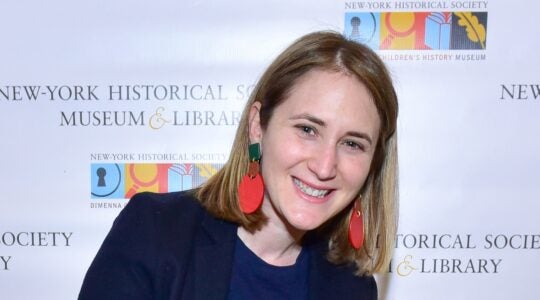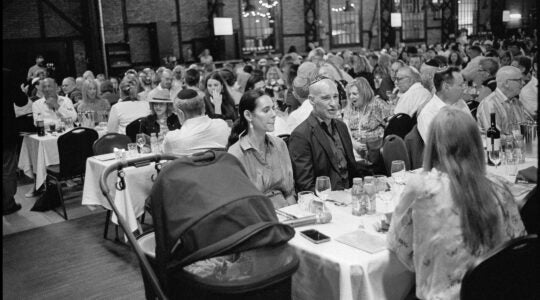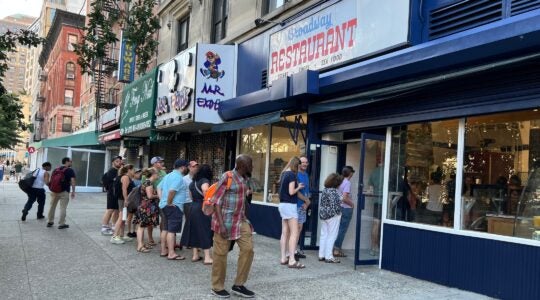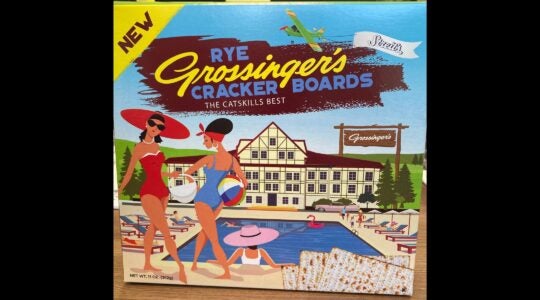The Village Vanguard is one of the half-dozen most important jazz clubs in the world, a venue that every musician wants on his résumé and one that can launch a career. As John Zorn wrote in a recent e-mail, “It is one of the best rooms in the city for music, with a really heavy history.”
Despite his own impeccable credentials, Zorn, 60, a leading light in jazz and Jewish music circles, had never played the Vanguard. But that will change Sept. 2-7 when the club hosts 11 bands associated with the saxophonist-composer-organizer in a live retrospective of his “Book of Angels” compositions for the band Masada, his ensemble that blends forward-thinking jazz and Jewish music. In addition to an appearance with Masada on Sept. 6, Zorn will be guesting on five of the late-night sets that week.
How did the gig come about? The answer is simple: “Debbie Gordon asked me,” Zorn wrote.
Deborah Gordon comes from jazz royalty. Her father Max founded the Village Vanguard and ran the fabled club until his death in 1989 when her mother, Lorraine, took over. Lorraine has long dreamed of having Zorn play the club and she kept urging her daughter to invite him.
After all, Zorn and the younger Gordon went to high school together in the early 1970s — “the UN school,” Zorn noted almost incredulously.
Gordon laughs and recalls that her mother “would tell me, ‘I know you know him and you went to school.’ But I didn’t think he’d want to. He has his own club [The Stone].” A few years ago, our general manager saw him at the Vanguard and passed the idea by him, but it wasn’t right yet.”
Then, as Gordon puts it, “Everything lined up perfectly — boom, boom, boom.”
Eyvind Kang, violist and frequent Zorn collaborator, was playing the Vanguard with the acclaimed jazz guitarist Bill Frissell and noted that he had to run uptown to play a gig with Zorn at Town Hall. Gordon used him to send a message to Zorn: “Tell him ‘Little Debbie Gordon’ — that’s not the name I’d usually give — sends her love and we really want him to be here at the Vanguard. The next day, John e-mailed me and that was that.”
Zorn gave a lot of thought to what he would do for the Vanguard week when it was offered.
He explained, “Rather than playing with one band for the run, I decided to give many different musicians a chance to play at the Vanguard, and I chose bands that would that would really sound GOOD [his emphasis] in that room. In a way it’s as much a retrospective of the downtown scene as it is a Masada festival, 11 bands across six nights.”
That openness and generosity is typical of Zorn, as Gordon notes.
“He’s an embracing, garrulous person,” she says. “Even without having seen John for many years until recently, when we got together if felt like we just transcended all those years in a matter of seconds. We were at home and comfortable with each other as if no time had passed whatsoever, and I lay that firmly at his feet.”
His musical skills aside, Zorn appears to have an immense capacity for friendship and loyalty. For all the jokes about the “downtown mafia,” he has stayed in touch both personally and musically with a large core of talented musicians, and is always expanding that group.
“I keep an eye on people for years and then something clicks,” he wrote.
For Jon Madof, whose band Zion80 is part of the Vanguard week, Zorn has been a pivotal figure.
“It’s hard to express how inspirational and exciting his music is to me,” Madof said last week. “The personal connection that we’ve developed over the past 10 years has made everything else even deeper.”
Rabbi (and saxophonist) Greg Wall, who has been a part of Zorn’s extended musical family and a Tzadik (Zorn’s label) recording artist for even longer. “Making a living playing music in New York, especially Jewish-themed music, he said, “can involve risks of compromising one’s artistic instincts for the sake of increasing performing opportunities and cash flow. Zorn refuses to settle, refuses to play any music that doesn’t resonate deeply, and demands the same from the artists he chooses to record on his label, and appear on stage with.”
Yet Zorn gives musicians a lot of room to express their own personalities, even if they are doing so through his compositions.
“For my own ensembles like Masada, Masada String Quartet, Bar Kochba … I choose the tunes and arrange the music and conduct on stage,” he wrote. “For most of the other bands, I give them 10 or 12 tunes and let them do their thing. … For the most part I like to let them work on their own and encourage them to really let their imagination run wild.”
Wall says, “Zorn offers much encouragement and a very long leash,” says Wall. “I don’t think he considers the Masada compositions finished until they are being played by the artists he has chosen to give them to.”
And probably not even then, if sax player Uri Gurvich is any guide. Gurvich, who will be playing with his quartet during the week at the club, wrote, “The compositions, which have a clear, distinct sound, really act as an open platform, and there is a lot of room for interpretation, which makes it challenging and exciting at the same time.”
At least one thing is certain, as Deborah Gordon noted. Lorraine Gordon “is very excited that John is finally going to be here.”
“John Zorn’s Masada – Angels at the Vanguard,” will be performed at the Village Vanguard (178 Seventh Ave. South, just below 11th St.) Sept. 2-7, with sets at 8:30 and 10:30 p.m. Bands performing will include Masada, Zion80, the Uri Gurvich Quartet, the Uri Caine Trio, Erik Friedlander solo, the Eyvind Kang Ensemble, and several others. For a full list of participating musicians and more information, go to http://villagevanguard.com.
The New York Jewish Week brings you the stories behind the headlines, keeping you connected to Jewish life in New York. Help sustain the reporting you trust by donating today.




